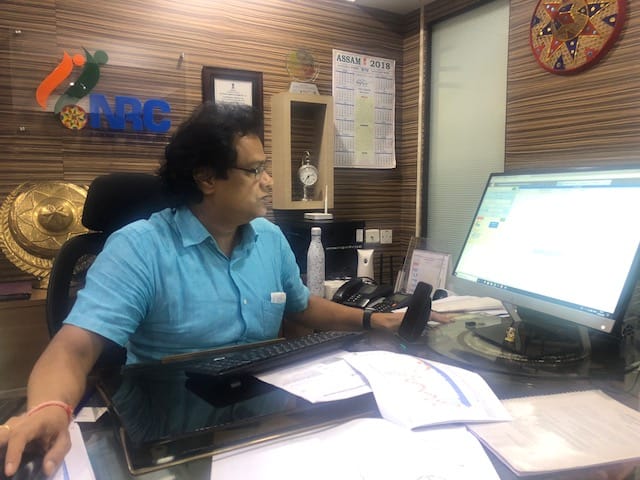New Delhi: A little over a month-and-a-half after the final list of the National Register of Citizens (NRC) in Assam was published, Prateek Hajela, the man behind the complex and exhaustive exercise, was unexpectedly transferred out of the state Friday — even before the completion of the entire process.
The script for NRC was written way back in the 1985 Assam Accord but it’s Hajela, a 1995-batch IAS officer of the Assam-Meghalaya cadre, who executed it over three decades later.
On Friday, the Supreme Court ordered his inter-cadre transfer to Madhya Pradesh on deputation, reportedly because he had received “death threats”.
It has been a long and tumultuous journey for Hajela as NRC state coordinator — he presided over an exercise that is socially sensitive as well as a political hot potato.
Also read: Bengali Hindu women not on NRC pin hopes on BJP promise of another list, citizenship bill
An ‘outsider’ in Assam
A B.Tech in Electronics from the Indian Institute of Technology, Delhi, Hajela is originally from Bhopal. Being a non-Assamese was perhaps a key reason for him getting picked to head the NRC exercise — given the process has deep-rooted ethnic connotations and an indigenous person ran the risk of looking at it through a tinted lens.
Before being picked for this tough task, Hajela had served as district collector of Nagaon, Kamrup Metropolitan as well as Goalpara, besides heading the Sarva Shiksha Abhiyan and the National Rural Health Missions in the state.
Given his years in Assam, Hajela managed to pick up the language well enough to converse in it fluently, but of course, minus the unmistakable Assamese accent and intonation.
It was in September 2013 that the Supreme Court directed the Assam government to start updating the NRC. The then Congress government headed by Tarun Gogoi picked Hajela to head the process.
Also read: Modi govt’s Citizenship Amendment Bill silent on rights of Gorkhas, Koch Rajbongshis & Bodos
His NRC years
The exercise has absolutely no precedence and carrying it out meant having to begin by drawing extensive plans and setting up an entire office.
“This was an unprecedented exercise. I didn’t know how to go about it. There were a set of rules but I didn’t know how to implement them. This involved creating the entire machinery from scratch. My experience of heading the Sarva Shiksha Abhiyan and the National Rural Health Missions in the state helped me greatly,” Hajela had told ThePrint in August 2018, after the second NRC list was published.
Essentially, a structure had to be created, which came in the form of a State Project Management Unit (SPMU) with 23 officials — a state coordinator, an executive director as well as planning, media, finance and other domain experts. District units were then formed.
Hajela and his team did extensive research on the background of NRC and the state’s ethnic fault lines before the rules governing the process were drafted. By March 2014, the planning was complete and Hajela’s current NRC office was set up in early 2015, initially with five staff members. The process finally kicked off in May 2015 when applications began pouring in.
What it turned into was nothing short of a behemoth — requiring over Rs 1,000 crore worth of funds, more than a hundred terabytes of data and a human resource touching nearly 70,000 people.
At the top of this tentacled web was Hajela, who worked on NRC for nine years till the final list was released in August this year, leaving out 19 lakh people — less than 6 per cent of those who applied.
The controversies
Hajela’s journey as NRC state coordinator, however, has barely been free of bumps. The exercise managed to acquire deep political undertones, and the final result left all stakeholders disappointed. The ruling Bharatiya Janata Party has been unhappy because the number of Hindus excluded is significant and the All Assam Students Union, which spearheaded the Assam Agitation, has said it doesn’t accept the list because the number of those it identifies as non-Indians is way less.
All of their ire has been directed at Hajela, with them questioning the correctness of his method and findings.
Hajela, in fact, has even been at odds with both the Centre and Assam government. The two BJP governments had demanded a re-verification exercise be conducted, but Hajela told the court it wasn’t quite necessary. The SC agreed with him.
This, however, isn’t to say Hajela had a smooth ride with the apex court. In August last year, after the final NRC draft was out, the court severely reprimanded him for talking to the media. “What is your authority to make such statements? What impelled you to go to the press like this?” the SC had said.
The senior official retreated into a shell of sorts after the court’s censure, choosing to completely stop interacting with the media or making statements that can be construed as being out-of-turn.
What happens to NRC exercise now?
The task started by Hajela is not yet over. Each one of those excluded who want to appeal to the Foreigners Tribunal will need to approach their local NRC office for an ‘exclusion certificate’ on the basis of which they can approach the tribunal.
The NRC will also have to be regularly updated — for example, revision of electoral rolls to account for births, deaths and migration.
Not only is Hajela NRC state coordinator, but he also heads the NRC Directorate, which would be responsible for this process.
With his transfer, the question is now who will carry out the remaining task.
Also read: Congress backs NRC in Assam, but not the way it is being implemented: Jaiveer Shergill






